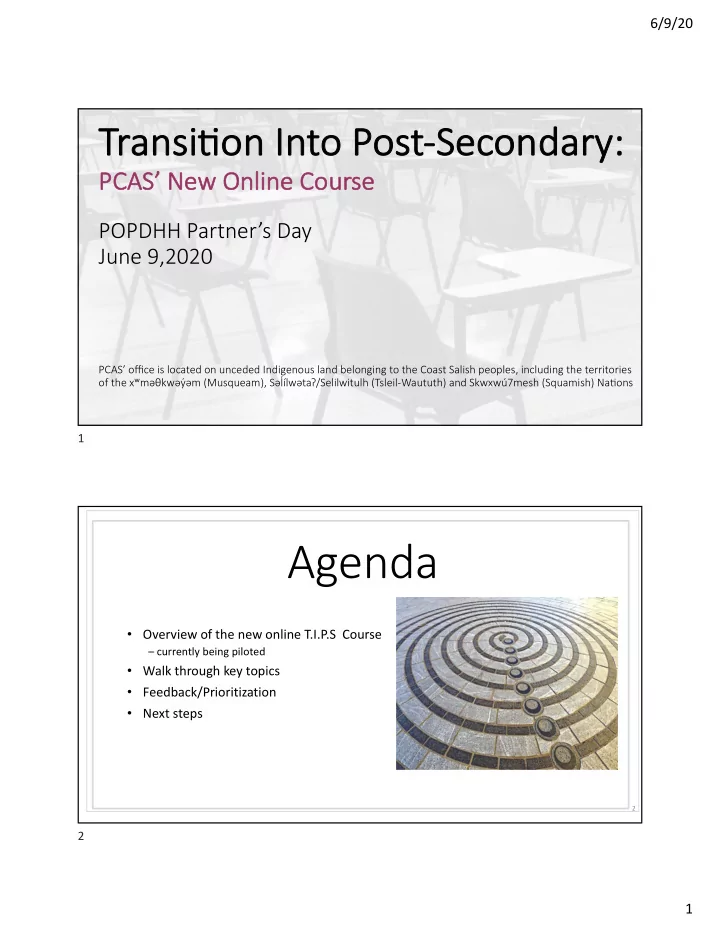

6/9/20 Tr Transi'on Into nto Post-Secondary: y: PCA PCAS’ Ne New Online e Cou Course e POPDHH Partner’s Day June 9,2020 PCAS’ office is located on unceded Indigenous land belonging to the Coast Salish peoples, including the territories of the xʷməθkwəy̓əm (Musqueam), SəlHílwətaʔ/Selilwitulh (Tsleil-Waututh) and Skwxwú7mesh (Squamish) NaRons 1 Agenda • Overview of the new online T.I.P.S Course – currently being piloted • Walk through key topics • Feedback/Prioritization • Next steps 2 2 1
6/9/20 https://www.youtube.com/watch?time_continue=78&v=C_zZskPYQhQ &feature 3 OVERVIEW “Universal Design is the design and composi5on of an environment so that it can be accessed, understood and used to the greatest extent possible by all people regardless of their age, size, ability or disability.” - Centre for Excellence in Universal Design 4 4 2
6/9/20 ASSIGNMENT 1 COMPETENCIES Personal Competencies • Personal Mastery • Learning, Creativity, & Innovation Academic Competency • Evidence-based Scholarship (here to stay!) 5 ASSIGNMENT 1 You will adopt a critical theory approach to synthesize, compare, contrast and critically analyze your understanding of leadership from the assigned readings in weeks 1 through 3 and beyond (readings from other courses, areas of interest). Your paper should: • Synthesize, compare and contrast the perspec3ves of at least 3 authors • Cri3cally analyze and consider how they differ or have similari3es to any of the other readings • Discuss the elements of your chosen perspec3ve in terms of construc3ve contribu3on to leadership in the 21 st century • Between 750-1000 words (max.) 6 3
6/9/20 ASSESSMENT CRITERIA FOR ALL ASSIGNMENTS • Meets all competency based assignment outcomes • Integration of Evidence • Structure: is clear, compelling, and flows ina logical sequence • Format: is formatted and referenced according to APA (7) 7 WRITING TIPS • Develop a strong narrative and write in the 1 st person • Avoid starting a sentence with “it”, “there” “and” or “because”. • Review your choice of words, instead of “look at” or “to see if” use ”examined”, “determined” • Remove excess words “There is/are; what the study found; regarding, etc. For example: in leadership positions…” 8 4
6/9/20 PARTICIPATION LOG • Download the participation log • Populate the log each week • I will offer formative feedforward 9 SUPPORTING YOUR SUCCESS 10 5
6/9/20 PARTICIPATION • Regular and timely contributions • Postings demonstrate critical thinking about the week’s topic, including analysis and syntheses of ideas in the readings, other sources and from your own experience • Reflection on your assumptions and taken-for- granted perspectives • Reflection on the postings of your peers and integrating ideas from more than one peer • Respectful of ideas and time of your peers • Communicate to myself and your team h"ps://www.youtube.com/Self-Advocacy 11 12 6
6/9/20 13 14 7
6/9/20 15 16 8
6/9/20 17 LEAD 516 ASSIGNMENTS: Priorities - Grade 12 students? WRITING TIPS • Include an introduction (first paragraph) to situate your paper. In the paragraph present your thesis (argument) and what you will be writing about. Tell me what you are going to do. • Build paragraphs that incorporate your voice. DO NOT develop paragraphs that ONLY contain citations or paraphrases (e.g., quote, after quote, after quote). • Any statements of fact that you make must be supported with sources from the literature. • End your paper with a concluding paragraph that ties back to the introduction (describes your conclusion; what you wrote about). Tell me what you just did….and, perhaps what you learned. 18 9
6/9/20 Q&A When is a good time to start this course with our students? - Offering this course as early as grade 10 would be beneficial! We have had students in the past attend from grade 10 and I think there is tremendous benefit in developing peer networks, and facilitating the self determination and self- advocacy piece early. Too often we hear from adult learners that they wish they had been comfortable self-advocating earlier in their post secondary career and regretted the lost learning and opportunities because they didn't want to be singled out. Should TDHHS familiarize themselves with this course before using it with students? - Yes, it would be up to teachers to monitor the progress of students. Once our final pieces of feedback are integrated into the course, we will be launching a train-the-trainer for teachers to delve into the modules. What if I have a student graduating this year? Please do reach out to PCAS in the meantime if you have specific needs right now to support graduating students: dpiper4@bcit.ca What are the next steps to having my students participate in this course? We will be in touch with next steps for the train the trainer and full access to the course. We will also create a distribution list for TDHHs. Please contact dpiper4@bcit.ca for more information.
Recommend
More recommend